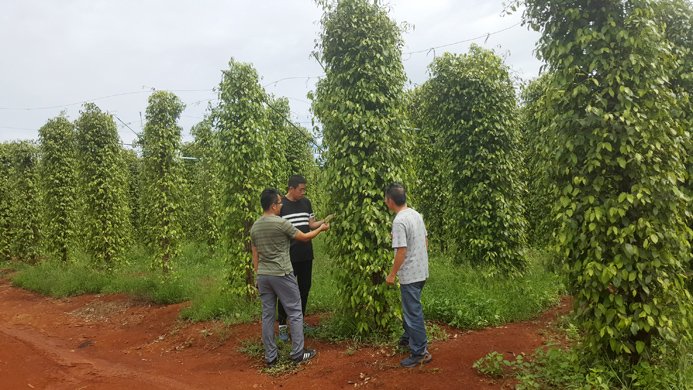From 6th to 15th June, three associate professors Yang Jianfeng, Zheng Weiquan and Li Zhigang from Spice and Beverage Crops Research Institute (SBCRI) under CATAS visited Cambodia for pepper resources survey and technology promotion at the invitation of Academy of Agricultural Sciences of Royal University of Agriculture, Cambodia.
In order to provide technical support to the development of the pepper industry in Cambodia, SBCRI applied project fund from Hainan Provincial Government and From the Ministry of Agriculture and Rural Affairs and got acceptance. With fund support of the approved projects,SBCRI scientists visited Cambodian pepper production areas such as Phnom Penh, Kampot Province, Tbong Kmoum Province and Kratié Province in Cambodia, and discussed with the relevant organizations on jointly conducting research and demonstration of pepper standardized production technology, while investigating the local agricultural development status, with special attention to local pepper industry development status as well as special spice resources distribution and development in Cambodia. The data collected from their investigation is believed to provide helpful basis for the smooth implementation of the projects.

Field observation of pepper production status in Cambodia
Their field investigation founded that the natural environmental conditions of Cambodia is suitable for pepper growth and development, and for scale development of high-quality pepper production, and that ecological planting should be the future practice. However, the current overall pepper production technology of Cambodia is relatively low, indicating by being lack of seedling standards and propagation norm, unreasonable field planning; neglect of management after planting; relatively backward processing technology and lower degree of mechanization; black pepper as the primary products, etc.
In view of the above problems, the project team planned to strengthen cooperation with local research institutions for joint project applications, and take projects as a link to rapidly advance cooperation activity on tropical agricultural science and technology, and will jointly strengthen technical training and guidance for technical personnel of the production sector to improve the technology capability of the local pepper production.


